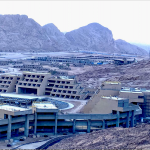EUP Policy Paper– by Professor Nikolaos Farantouris, Member of the European Parliament (MEP), The Left Group, Member of the Security and Defense Committee (SEDE) (*)
The policy paper, analyzes Syria’s shifting political and security landscape after the fall of Bashar al-Assad in December 2024 and the rise of Ahmad al-Sharaa (Jolani) and his group, Hayat Tahrir al-Sham (HTS). Based on a visit to Damascus in March 2025 and direct engagement with minority communities, Syrian officials, and church leaders, the report evaluates the impact of Syria’s transformation on minorities and proposes how the EU should recalibrate its strategy.
From Assad to Jolani: A Fragile Transition
For decades, Syria was ruled by the Assad dynasty, backed by Alawite networks and military structures. The 2011 Arab Spring protests spiraled into a civil war, which produced extremist groups such as ISIS and Al-Nusra Front. By late 2024, Israel’s blows to Hezbollah and the weakened Syrian army paved the way for HTS to capture Damascus. Assad was ousted on December 9, 2024, marking the end of Baathist rule
Jolani presented himself as a reformer, promising to dissolve militias and integrate fighters into a new Syrian army. Yet his regime quickly sidelined civil servants, dismantled state structures, and presided over ethnic and sectarian violence, particularly in Alawite and Christian areas.
The Interim Constitution and Islamist Rule
On March 14, 2025, Jolani signed a temporary constitution granting him sweeping powers for five years. It entrenched Islam as the “principal source of legislation” and only recognized “divine religions” (Islam, Christianity, Judaism). This excluded Druze, Ismailis, and Alawites, leaving them vulnerable to discrimination. Far from inclusive, the framework codified sectarian exclusion and consolidated Sunni Islamist dominance
Atrocities Against Minorities
Between March 6–10, 2025, HTS militias, joined by foreign fighters, launched mass killings in Alawite-majority villages on the western coast. Between 5,000 and 7,000 civilians were executed, tortured, or displaced, with widespread looting and burning of homes. Independent reports and church leaders confirmed the massacres. Patriarch John X of Antioch and other Christian leaders denounced the atrocities as crimes against humanity. Yet Jolani’s regime tolerated or even facilitated these attacks
Violence extended into May and June 2025. On June 22, a suicide bombing at the Greek Orthodox Mar Elias Church in Damascus killed 25 worshippers. Druze communities also suffered sustained assaults, prompting Israeli military strikes to deter further massacres
The Kurdish Factor
On March 10, 2025, the Kurdish-led Syrian Democratic Forces (SDF) signed an agreement with Damascus, integrating into the Syrian army as the “2nd Army.” The deal also established shared control of oil resources, vital since 90% of Syria’s reserves lie in Kurdish areas. While militarily pragmatic, Kurdish political leaders rejected Jolani’s Islamist constitution, calling instead for decentralized democracy and minority protections. Their stance highlights enduring fault lines between Damascus and Kurdish administrations
The EU’s Response
The EU’s approach has been inconsistent. The Brussels IX Conference in March 2025 pledged €2.5 billion in aid, focusing on reconstruction and humanitarian relief. High Representative Kaja Kallas emphasized economic recovery but avoided setting conditions tied to minority rights or democratic reform. Critics argue the EU has equated victims and perpetrators by condemning “all violence,” failing to confront HTS’s responsibility
Germany, France, and Italy have reopened diplomatic channels with Damascus to secure reconstruction contracts and energy interests. German Foreign Minister Annalena Baerbock’s March 20 visit to reopen the embassy in Damascus underscored Europe’s desire for engagement despite HTS’s extremism. This pragmatic shift risks sidelining the EU’s values-based foreign policy
Turkey’s Position
Turkey remains focused on eliminating Kurdish autonomy, securing refugee returns, and expanding influence in northern Syria. Controlling 8,800 square kilometers inside Syria, Ankara has trained militias, built buffer zones, and pursued reconstruction contracts. President Erdoğan seeks to reshape Damascus into a client state aligning with Turkish regional ambitions. Meanwhile, Turkey distances itself from Western policy, complicating EU and NATO strategies
The U.S. Policy Reversal
Initially, U.S. officials condemned HTS atrocities. Senator Marco Rubio demanded investigations into the Alawite massacres. But on May 14, 2025, President Donald Trump announced a normalization process with Jolani after a meeting in Riyadh mediated by Saudi Arabia and Turkey. Sanctions relief was offered in exchange for Syria potentially joining the Abraham Accords. While this boosted optimism in Damascus, Israel remains skeptical, citing security risks and the presence of jihadist networks
Ongoing Violence Against Minorities
Despite diplomatic overtures, violence against Christians, Druze, and Alawites has worsened. Attacks on worshippers, religious sites, and civilian communities highlight Jolani’s inability—or unwillingness—to rein in extremist factions. Israeli strikes in defense of Druze populations signal growing regional risks of escalation
Proposals for the EU
The report concludes with urgent recommendations for the European Parliament:
- Send an inter-parliamentary delegation to Syria for independent fact-finding.
- Condition engagement on democratic reforms, including equal rights for minorities.
- Push for accountability for perpetrators of massacres, including HTS leadership.
- Tie financial assistance to governance reform, ensuring aid supports pluralism and rule of law
Farantouris argues that Europe faces a moral and strategic imperative: to support a genuine democratic transition, protect minorities, and counter extremism, rather than sacrificing principles for short-term economic interests.
Conclusion
Syria’s “zero hour” presents Europe with both risk and responsibility. The collapse of Assad’s regime did not bring peace, but ushered in a fragile Islamist-led order marked by violence against minorities and geopolitical competition among Turkey, the U.S., and regional actors. The EU, caught between values and interests, must decide whether to continue engagement without conditions or assert a principled, proactive stance demanding accountability, inclusivity, and democracy.
The paper insists that failure to act decisively will entrench sectarianism, embolden extremists, and undermine Europe’s credibility. “The time to act is now,” it concludes
(*) Completed with the scientific co-operation of Dr Athanasios Grammenos, Foreign Affairs Advisor
Read full text:





